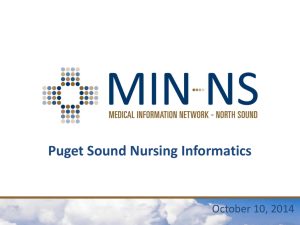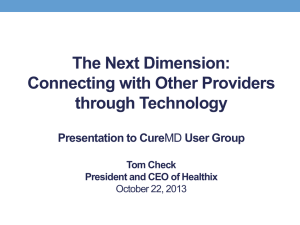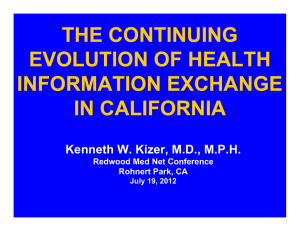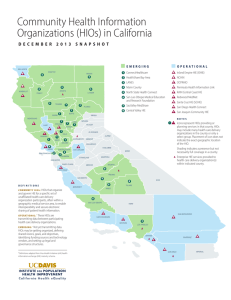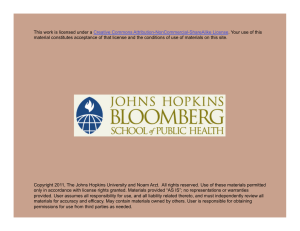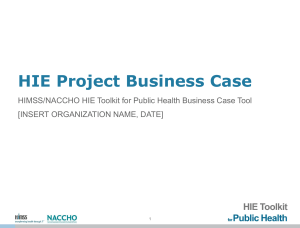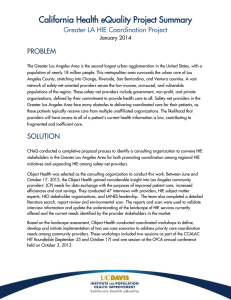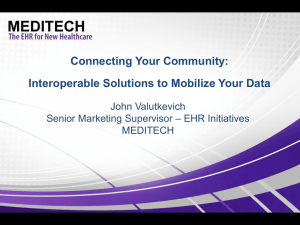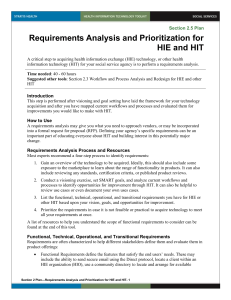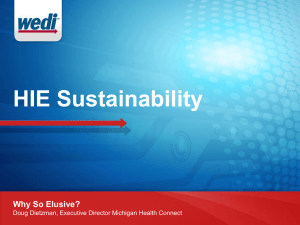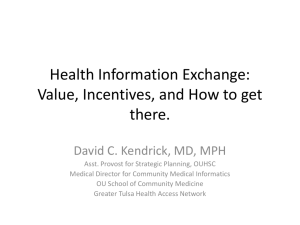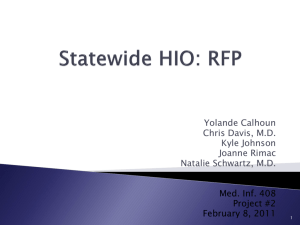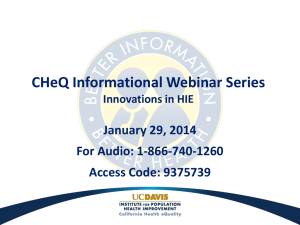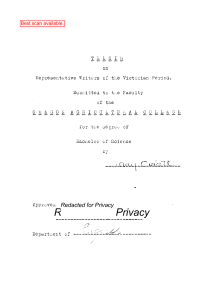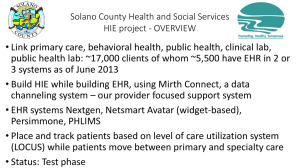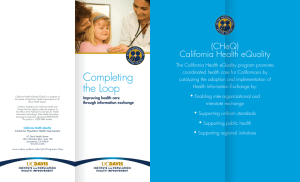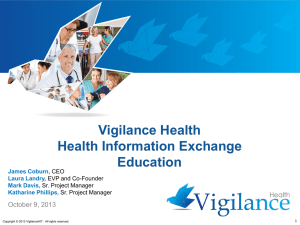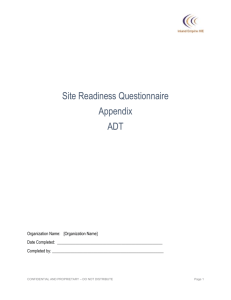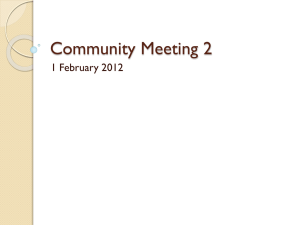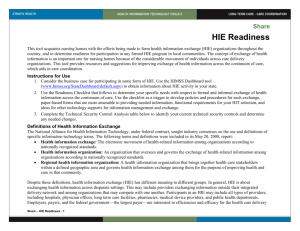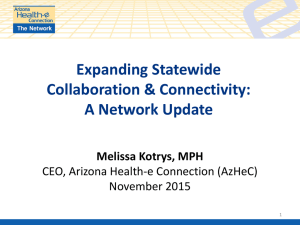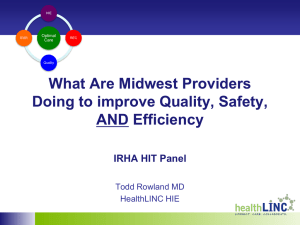Presentation
advertisement
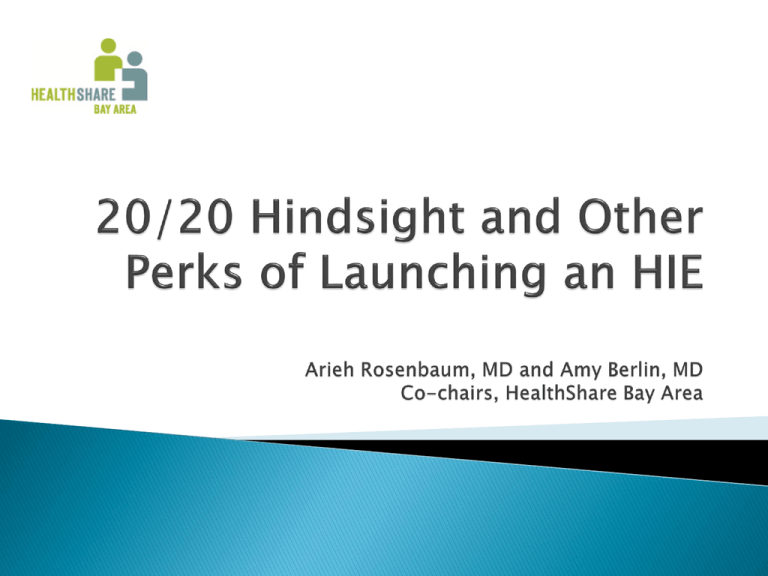
Arieh Rosenbaum, MD Director of Medical Informatics, Hospitalist at California Pacific Medical Center in San Francisco Attended CAeHC town hall in San Francisco in May 2009 and the rest is history… Amy Berlin, MD Psychiatrist in private practice in San Francisco Asked in early 2010 by CEO of San Francisco Medical Society to co-chair governance committee and has not looked back since Population: Hospitals: Physicians: • • • • • • • 805,000 11 ~ 3,000 Significant patient organizational crossover Substantial safety net population Multiple large organizations in various stages of technology deployment Large independent physician population Two large tertiary/quaternary care organizations History of fierce competition between large organizations No predominant non-government payer ARRA/HITECH the initial spark for early efforts CAeHC Town Hall (5/28/09) Stakeholder meeting #1 (8/20/09) Incorporation into SFMS CSF 501(c)(3) Development of Governing Committee Structure Development of use cases/data sharing priorities Planning funds requirements Hospital Council presentation (2/10/10) Governing Committee Kickoff (3/17/10) Initial task of the governance committee was to evolve into a cohesive working group Much thought went into structure of our initial meetings Anticipated release of CeC grant application functioned as orienting milestone Early reconnaissance – meetings with Axolotl (a local vendor), a visit to Santa Cruz HIE, reviewing the literature (KLAS reports, etc.) Lessons learned Impossible to chart path of an effort as nebulous as launching an HIE more than one step at a time Give team members time to settle into their new roles and trust the leadership of the group Face-to-face meetings are crucial to building cohesiveness (conference calls work better later on) Generating RFIs & RFPs Cast a wide net to identify vendors RFI constructed on shoestring budget RFI released to 16 vendors -> 11 responses -> short list (6) -> RFP released to 4 -> 2 finalists Lessons learned The national HIE community is small, collaborative, and eager to share Use seed funding for focused professional services Delegate detail-intensive processes to subcommittees RFIs, RFPs have educational value for committee All HIEs need a healthy dose of serendipity Our approach to funding has evolved significantly Early days full of financial “brainstorming” SFMS provided “anchor donation” Other organizations slowly followed Key planning grant from MettaFund Still working on payers THE BUSINESS PLAN Key to buy-in from stakeholder organizations as we approached the big “ask” for CeC matching funds Utilized business development consultant services for budget model Business plan outlined (the mostly indirect) evidence for ROI from HIEs – hard numbers difficult to come by in current HIE literature Lessons learned Budget for business development from day one Crucial to business strategy is plan to evolve, in the early years of operations, from strict reliance on grant funding As we evolve, so will our business plan (we are currently working on version #2) Value prop for individual organizations can be variable Rounding the bend on RFP release, we are closing in the deadline for MOU submission from stakeholder organizations when… Round robin with committee reps was overwhelmingly positive Key stakeholder organization falls through, creating a domino effect Application for Cal eConnect funding aborted Lessons learned HIE is still an abstraction for many executives Go directly to your customer; representative model must be supplemented No substitute for face time between C-suite and HIE leaders A comprehensive outreach effort Direct dialogue with stakeholder decisionmakers Meetings with local and state civic leaders, leading to favorable Op-Ed in the San Francisco Examiner co-authored by Arieh and a mayoral candidate Rebranding as HealthShare Bay Area Lessons learned Plan on an intricate network of point-to-point interfaces (e.g., LOTS OF FACE TIME) to build stakeholder trust and to make sure the “source data” (details of HIE technology, sustainability, and governance) get to the desired recipient (check-writing decision makers) Anticipate decisionmakers’ priorities, questions, and fears Understand the history and the culture of each participating organization It’s one thing to release an RFP, it’s another to score it Tension between desire for purely “democratic” scoring process and the reality of inadequate understanding of HIE vendor differentiators among constituents Pursued a “salon” style of scoring responses, with technical expert as leader RFP scoring process enhanced group cohesiveness Demos an opportunity to showcase effort Comprehensive, clinically driven demo scripts Webinar, recorded to allow for remote and asynchronous participation Preparing for reference checks and site visits in coming weeks Lessons learned “Marathon” salon sessions allowed for deep dive and shared understanding of vendor offerings Deep technical expertise crucial to evaluations Use demos as an outreach and educational tool for stakeholder constituents Recent accomplishments & activity Growing interest from East Bay stakeholders Preparing for vendor negotiation Recruiting legal services to draft participation agreements Networking with Cal eConnect Community of Practice and other groups Take home points Launching an HIE is like launching a start-up Assemble a multi-disciplinary team Productive collaborations, learning curves, and trust building require time and face to face meetings Use planning funds wisely Study HIE success stories Get lots of practice answering difficult questions There is no HIE “roadmap” – learn to love trial and error Arieh Rosenbaum, MD RosenbA@sutterhealth.org Amy Berlin, MD amy@amyberlinmd.com
